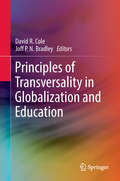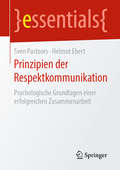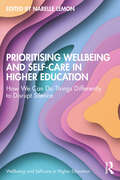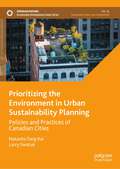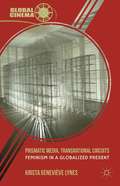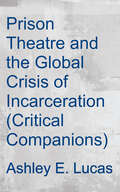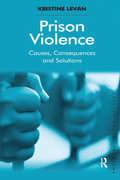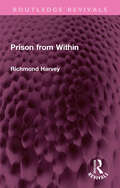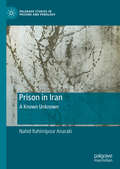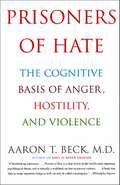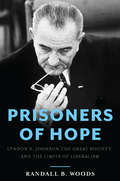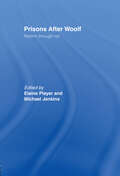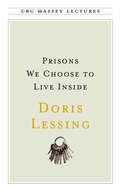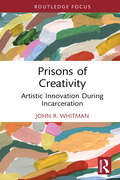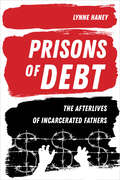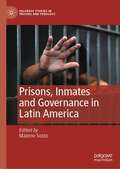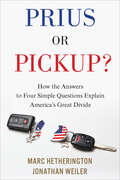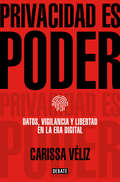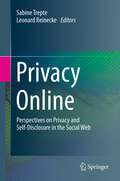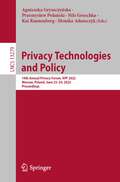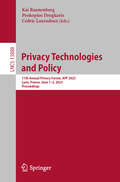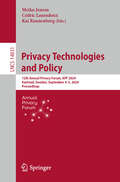- Table View
- List View
Principles of Transversality in Globalization and Education
by David R. Cole Joff P.N. BradleyThis unique book comprehensively covers the evolving field of transversality, globalization and education, and presents creative, research-based thought experiments that seek to unravel the forces of globalization impacting education. Pursuing various approaches to and uses of transversality, with a focus on the ideas of Félix Guattari, it is the only book of its kind. Specifically, it examines the influence of Guattari at the forefront of educational research that addresses, enhances and sets free activist micro-perspectives, which can counter macro-global movements, such as capitalism and climate change. This book is a global education research text that includes perspectives from four continents, providing a balanced and significant work on globalization in education.
Prinzipien der Respektkommunikation: Psychologische Grundlagen einer erfolgreichen Zusammenarbeit (essentials)
by Helmut Ebert Sven PastoorsDieses essential erläutert anhand praxisorientierter Beispiele die Prinzipien der Respektkommunikation. Es konzentriert sich dabei auf die vier Bereiche Selbstrespekt, Kommunikation, Integration und Mitarbeiterführung. Diese Prinzipien helfen den Lesern, ihre Ziele souverän und respektvoll zu erreichen. Gleichzeitig können sie mit diesen Prinzipien verhindern, dass die eigene Verwirklichung auf Kosten anderer erfolgt und so zu immer kurzfristigeren Erfolgen in den genannten Bereichen führt.
Prioritising Wellbeing and Self-Care in Higher Education: How We Can Do Things Differently to Disrupt Silence (Wellbeing and Self-care in Higher Education)
by Narelle LemonThis book illuminates international voices of those who feel empowered to do things differently in higher education, providing inspiration to those who are seeking guidance, reassurance, or a beacon of hope.Doing things differently comes with an awareness and curiosity to explore what can be. Increasingly, more and more professionals in higher education are choosing themselves, happiness, families, relationships, kindness, and compassion over arbitrary notions of institutional prestige, continuous pressure to overwork, and competitiveness with others. The chapters in this book do more than highlight flaws in the system, they call for proactive engagement in interrupting and reimagining what is broken. The authors share their own experiences as a way of encouraging readers to take small steps towards self-care, to notice their surroundings, and to embrace change as an empowering tool. The focus is on becoming the change we aspire to see, with a collective readiness to instigate positive transformations.Sharing ambitious ideas to encourage change, this book is a valuable resource for those seeking to enhance their self-care and wellbeing in the higher education context, and for those seeking to engage with others in support of these efforts.
Prioritizing the Environment in Urban Sustainability Planning: Policies and Practices of Canadian Cities (Sustainable Development Goals Series)
by Larry Swatuk Natasha Tang KaiThis book examines the extent to which the environment is addressed in the sustainability plans of Canadian cities. It assesses if and to what extent select leading environmental priorities are addressed in the sustainability plans of sixteen Canadian cities, followed by analysis of efforts towards each priority. It scores and ranks cities against each environmental priority and highlights what makes some cities lead and others lag in environmental sustainability.The book unravels the complexity, similarities, and differences in environmental sustainability planning across major cities in Canada. The project reflects what’s working, who’s leading, and which environmental priorities support the sustainable city model. Climate change has exacerbated the impacts of flood, droughts, wildfire and storms, urban centers must account for sustainability to mitigate and adapt to a changing and uncertain landscape. It begins with robust and integrative sustainability plans that prioritize the environment. This book will make a timely contribution to the on-going debate regarding the ways and means to become a sustainable city. It reflects the on-going sustainable development discourse and deliberations to meet the Sustainable Development Goals. It cut across many SDGs in particular SDG 11, Sustainable Cities and Communities. What makes this study unique is its special attention to environmental priorities within urban sustainability planning. This subject is topical and would appeal to both scholars and practitioners at local, regional, national, and global scales.
Prismatic Media, Transnational Circuits: Feminism in a Globalized Present (Global Cinema)
by Krista Geneviève LynesWhat are the political and aesthetic dimensions of video art, documentary, and global cinema in contemporary image culture? Lynes makes visible how sites of political struggle, exploitation, and armed conflict can be interpreted through a feminist politics of location, attentive to the frictions and flows within transnational circuits of exchange.
Prison Gangs Behind Bars and Beyond: A Vicious Game (Palgrave Studies in Risk, Crime and Society)
by Dev Rup MaitraThis book draws on a four-year ethnographic study conducted in the prisons and on the streets of Greater Manchester, England, to examine gangs and organised crime in the North of England. It includes the personal testimonies of active prison gang members and major organised crime figures, many of whom are behind bars, and some active street gang members. It presents an holistic account by exploring the linkages that exist between prisons and the streets, including the lines of continuity between gangs on both sides of the prison walls and how gang affiliation straddles this divide. It offers data on the region’s drug market (specifically Class A drugs) as this market is the lynchpin of the underworld, both within and without prison. It also includes the perspectives and insights of prison officers, police detectives, youth workers, active and former street gang members and the parents of deceased gang members. This is a ground-breaking, contemporary study, analysing English gang compositions and activities, with its findings and results based on qualitative interviews and ethnographic research.
Prison Theatre and the Global Crisis of Incarceration
by Patrick Lonergan Kevin J. Wetmore Jr. Ashley E. LucasObscured behind concrete and razor wire, the lives of the incarcerated remain hidden from public view. Inside the walls, imprisoned people all over the world stage theatrical productions that enable them to assert their humanity and capabilities. Prison Theatre and the Global Crisis of Incarceration offers a uniquely international account and exploration of prison theatre. By discussing a range of performance practices tied to incarceration, this book examines the ways in which arts practitioners and imprisoned people use theatre as a means to build communities, attain professional skills, create social change, and maintain hope. Ashley Lucas's writing offers a distinctive blend of storytelling, performance analysis, travelogue, and personal experience as the child of an incarcerated father.
Prison Violence: Causes, Consequences and Solutions (Solving Social Problems)
by Kristine LevanDrawing on a range of research and media sources to provide an international perspective on the topic of prison violence, this book focuses on the impact of such violence on the individual both while he or she is incarcerated and upon his or her release from prison, as well as on society as a whole. With a special emphasis on comparisons of violence among incarcerated populations in the United States, Canada and the United Kingdom, Prison Violence: Causes, Consequences and Solutions explores the various systems that exist to combat the problem, whilst also considering public perceptions of offenders and punishment, as influenced by media and coverage of high-profile cases. Providing a comprehensive analysis of prison violence on national and international levels, this book examines the extent of the problem, theoretical understandings of the issue and concrete solutions designed to prevent and handle such violence. As such, it will be of interest to policy makers as well as scholars of sociology, criminology and penology.
Prison from Within (Routledge Revivals)
by Richmond HarveyFirst published in 1937, Prison from Within is a first-person account of a prisoner sentenced to imprisonment for eighteen months for fraud. It is a linear narrative honestly recording the various facets of prison culture, along with candid character analysis. The book touches upon philosophical notions of sin and remorse; the social groups of prisoners and the camaraderie shared among them; the poor living condition of prisons and the exploitation of prison labour; and the general politics of the time. The book successfully humanizes criminals and is an excellent reminder of the fact that the prison industry has only worsened with time. Prisons were designed for the purpose of ‘cleansing’ bourgeoise society; therefore, it is important to revisit the institution and question its utility in modern times. This book will be of interest to students and teachers of history, sociology, criminology, criminal justice, literature, and penology.
Prison in Iran: A Known Unknown (Palgrave Studies in Prisons and Penology)
by Nahid Rahimipour AnarakiThis book offers a unique look into prisons in Iran and the lives of the prisoners and their families. It provides an overview of the history of Iranian prisons, depicts the sub-culture in contemporary Iranian prisons, and highlights the forms that gender discrimination takes behind the prison walls. The book draws on the voices of 90 men and women who have been imprisoned in Iran, interviewed in 2012 and 2017 across various parts of the Islamic Republic of Iran. It presents a different approach to the one proposed by Michel Foucault in Discipline and Punish because the author argues that Iran never experienced “the age of sobriety in punishment” and “a slackening of the hold on the body”. Whilst penal severity in Iran has reduced, its scope has now extended beyond prisoners to their families, regardless of their age and gender. In Iran, penalties still target the body but now also affect the bodies of the entire prisoner’s family. It is not just prisoners who suffer from the lack of food, clothes, spaces for sleeping, health services, legal services, safety, and threats of physical violence and abuse but also their families. The book highlights the costs of mothers’ incarceration for their children. It argues that as long as punishment remains the dominant discourse of the penal system, the minds and bodies of anyone related to incarcerated offenders will remain under tremendous strain. This unique book explores the nature of these systems in a deeply under-covered nation to expand understandings of prisons in the non-Western world.
Prison, Inc.: A Convict Exposes Life Inside a Private Prison (Alternative Criminology #14)
by K.C. CarceralPrison, Inc. provides a first-hand account of life behind bars in a controversial new type of prison facility: the private prison. These for-profit prisons are becoming increasingly popular as state budgets get tighter. Yet as privatization is seen as a necessary and cost-saving measure, not much is known about how these facilities are run and whether or not they can effectively watch over this difficult and dangerous population. For the first time, Prison, Inc. provides a look inside one of these private prisons as told through the eyes of an actual inmate, K.C. Carceral who has been in the prison system for over twenty years.
Prisoners Of Hate: The Cognitive Basis of Anger, Hostility, and Violence
by Aaron T. Beck"Prisoners of Hate offers a profound analysis of a most pressing human challenge: the causes—and prevention—of hatred. Of the many important books Aaron Beck has written, this may be his greatest gift to humanity." —Daniel Goleman, author of Emotional IntelligenceWorld-renowned psychiatrist Dr. Aaron T. Beck has always been at the forefront of cognitive therapy research, his approach being the most rapidly growing psychotherapy today. In his most important work to date, the widely hailed father of cognitive therapy presents a revolutionary look at destructive behavior—from domestic abuse to genocide to war—and provides a solid framework for remedying these crucial problems. In this book, Dr. Beck:Illustrates the specific psychological aberrations underlying anger, interpersonal hostility, ethnic conflict, genocide, and war;Clarifies why perpetrators of evil deeds are motivated by a belief that they are doing good;Explains how the offenders are locked into distorted belief systems that control their behavior and shows how the same distortions in thinking occur in a rampaging mob as in an enraged spouse;Provides a blueprint for correcting warped thinking and belief systems and, consequently, undercutting various forms of hostility; andDiscusses how the individual and society as a whole might use the tools of psychotherapy to block the psychological pathways to war, genocide, rape, and murder.
Prisoners of Hope: Lyndon B. Johnson, the Great Society, and the Limits of Liberalism
by Randall B. WoodsPresident Lyndon Johnson's Great Society was breathtaking in its scope and dramatic in its impact. Over the course of his time in office, Johnson passed over one thousand pieces of legislation designed to address an extraordinary array of social issues. Poverty and racial injustice were foremost among them, but the Great Society included legislation on issues ranging from health care to immigration to education and environmental protection. But while the Great Society was undeniably ambitious, it was by no means perfect. In Prisoners of Hope, prize-winning historian Randall B. Woods presents the first comprehensive history of the Great Society, exploring both the breathtaking possibilities of visionary politics, as well as its limits.Soon after becoming president, Johnson achieved major legislative victories with the 1964 Civil Rights Act and the 1965 Voting Rights Act. But he wasn't prepared for the substantial backlash that ensued. Community Action Programs were painted as dangerously subversive, at worst a forum for minority criminals and at best a conduit through which the federal government and the inner city poor could bypass the existing power structure. Affirmative action was rife with controversy, and the War on Poverty was denounced by conservatives as the cause of civil disorder and disregard for the law. As opposition, first from white conservatives, but then also some liberals and African Americans, mounted, Johnson was forced to make a number of devastating concessions in order to secure the future of the Great Society. Even as many Americans benefited, millions were left disappointed, from suburban whites to the new anti-war left to African Americans. The Johnson administration's efforts to draw on aspects of the Great Society to build a viable society in South Vietnam ultimately failed, and as the war in Vietnam descended into quagmire, the president's credibility plummeted even further.A cautionary tale about the unintended consequences of even well-intentioned policy, Prisoners of Hope offers a nuanced portrait of America's most ambitious--and controversial--domestic policy agenda since the New Deal.
Prisons After Woolf: Reform through Riot
by Michael Jenkins Elaine PlayerFor the past few years prisons have attracted much media attention, due to substantial increases in the prison population and the deteriorating conditions in which prisoners are held. In addition, there has been industrial action by prison officers and a series of disturbances and riots by prisoners. Following the riot at Strangeways prison in Manchester in 1990 Lord Justice Woolf was called to conduct an inquiry into the riots and their causes. Prisons After Woolf serves as a basic source of information on prison issues and reviews them in the light of the Woolf proposals. In so doing, its contributors, drawn from all areas of the legal and prison system, present an important broad perspective on the major questions in penology today.
Prisons We Choose to Live Inside (The CBC Massey Lectures)
by Doris LessingIn her 1985 CBC Massey Lectures Doris Lessing addresses the question of personal freedom and individual responsibility in a world increasingly prone to political rhetoric, mass emotions, and inherited structures of unquestioned belief. The Nobel Prize-winning author of more than thirty books, Doris Lessing is one of our most challenging and important writers.
Prisons of Creativity: Artistic Innovation During Incarceration
by John R. WhitmanSparking a discussion of the importance of creativity for the well-being of society, this book highlights and argues for the potential of those in prison to learn and exercise the skills of writing, visual arts, and music; to protect their intellectual property; and to distribute their works to the public, and the consequent benefits of their creative contribution to wider society.Focused on the premise that a nation’s well-being and competitive advantage in innovation are advanced by promoting the creative efforts of all its citizens without exclusion, including those residing in prisons, this book uses the United States as a case study to illuminate the potential among any nation’s prison population to contribute to its store of creative works. Arguing that creativity should be encouraged for the benefit of all, it offers a framework for how incarcerated individuals globally could be permitted to engage in learning and undertaking skills in the expressive arts to produce works for public dissemination. Supporting this argument, it explores and analyses the Intellectual Property clause of the Constitution of the United States.Emphasizing not just the internal but also the external value of creativity in prison, Prisons of Creativity widens and elevates the discourse concerning the institution of prison in society and its social goals. It will be of great value to anyone with an interest in arts in corrections, including educators and practitioners, professionals and policy makers within the criminal justice system, and students and scholars of criminology, criminal justice, and related areas.
Prisons of Debt: The Afterlives of Incarcerated Fathers
by Prof. Lynne HaneyA profound portrait of the hidden injustices that trap fathers in a cycle of punishment and debt. In the first study of its kind, sociologist Lynne Haney travels into state institutions across the country to document the experiences of the millions of fathers cycling through the criminal justice and child support systems. Prisons of Debt shows how these systems work together to create complex entanglements—rather than "piling up" in men's lives, these entanglements form feedback loops of disadvantage. The prison–child support pipeline flows in both directions, deepening parents' debt and criminal justice involvement. Through moving accounts of men struggling to be fathers from behind prison walls and under the weight of support debt, Prisons of Debt exposes how the criminalization of child support undermines the most essential of familial relationships. Haney argues that these state systems can end up producing exactly the kind of parent they fear and loathe: bitter, unreliable, and cyclical fathers. Based on observations of 1,200 child support cases and interviews with 145 indebted fathers in New York, California, and Florida, Prisons of Debt reveals the actual practices of child support adjudication and enforcement alongside the lived realities of fathers trapped in those systems. The result is a rigorously documented analysis of how poor men are too often denied their rights of citizenship and of fatherhood.
Prisons, Inmates and Governance in Latin America (Palgrave Studies in Prisons and Penology)
by Máximo SozzoThis edited collection addresses the topic of prison governance which is crucial to our understanding of contemporary prisons in Latin America. It presents social research from Nicaragua, the Dominican Republic, Venezuela, Colombia, Ecuador, Brazil, Peru, Uruguay and Argentina to examine the practices of governance by the prisoners themselves in each unique setting in detail. High levels of variation in the governance practices are found to exist, not only between countries but also within the same country, between prisons and within the same prison, and between different areas. The chapters make important contributions to the theoretical concepts and arguments that can be used to interpret the emergence, dynamics and effects of these practices in the institutions of confinement of the region. The book also addresses the complex task of explaining why these types of practices of governance happen in Latin American prisons as some of them appear to be a legacy of a remote past but others have arisen more recently. It makes a vital contribution to the fundamental debate for prison policies in Latin America about the alternatives that can be promoted.
Prisons, Politics and Practices in England and Wales 1945–2020: The Operational Management Issues
by David J. CornwellThis book presents both a survey of and commentary upon the penal process of England and Wales between 1945 and 2020 from the primary perspective of prisons and their operational management. Part I focusses on the extent to which governmental polities, changing concepts in penology and significant events affected the performance and management of prisons during four key periods: 1945-1991; 1991-1997; 1997-2007 and 2007-2020. Part II presents a vision for more effective operation of prisons within the wider penal process in the 2020s and beyond. It draws upon the author's academic insights and his experience as a former prison governor. This book speaks to those in the social sciences, law and politics and to professionals in government and in the penal system who are interested in reform.
Prius Or Pickup?: How the Answers to Four Simple Questions Explain America's Great Divide
by Marc Hetherington Jonathan Weiler“In this fascinating look at contemporary politics, [the authors] set out to explain what really causes the extreme political polarization seen today.” —Publishers WeeklyWhat’s in your garage: a Prius or a pickup? What’s in your coffee cup: Starbucks or Dunkin’ Donuts? What about your pet: cat or dog? As award-winning political scholars Marc Hetherington and Jonathan Weiler explain, even our smallest choices speak volumes about us—especially when it comes to our personalities and our politics. Liberals and conservatives seem to occupy different worlds because we have fundamentally different worldviews: systems of values that can be quickly diagnosed with a handful of simple questions, but which shape our lives and decisions in the most elemental ways. If we’re to overcome our seemingly intractable differences, Hetherington and Weiler show, we must first learn to master the psychological impulses that give rise to them, and to understand how politicians manipulate our mindsets for their own benefit.Drawing on groundbreaking original research, Prius or Pickup? provides the psychological key to America’s deadlocked politics, showing that we are divided not by ideologies but something deeper: personality differences that appear in everything from politics to parenting to the workplace to TV preferences, and that would be innocuous if only we could decouple them from our noxious political debate. “A fascinating way to look at the fracturing of a nation.” —Kirkus Reviews“An exceptionally insightful and entertaining exploration of the roots of tribalism in American (and European) society and politics, and its ominous consequences for democracy.” —Thomas E. Mann, Senior Fellow, Brookings Institution
Privacidad es poder: Datos, vigilancia y libertad en la era digital
by Carissa VélizSeleccionado por The Economist como uno de los libros del año. La guía definitiva para afrontar uno de los problemas más acuciantes de nuestro tiempo: la pérdida de la privacidad. Nos vigilan. Saben que estás leyendo estas palabras. Gobiernos y cientos de empresas nos espían: a ti y a todos tus conocidos. A todas horas, todos los días. Rastrean y registran todo lo que pueden: nuestra ubicación, nuestras comunicaciones, nuestras búsquedas en internet, nuestra información biométrica, nuestras relaciones sociales, nuestras compras, nuestros problemas médicos y mucho más. Quieren saber quiénes somos, qué pensamos, dónde nos duele. Quieren predecir nuestro comportamiento e influir en él. Tienen demasiado poder. Su poder proviene de nosotros, de ti, de tus datos. Recuperar la privacidad es la única manera de que podamos asumir de nuevo el mando de nuestras vidas y de nuestras sociedades. La privacidad es tan colectiva como personal, y es hora de retomar el control. Privacidad es poder es el primer libro que propone el fin de la economía de los datos. Carissa Véliz explica cómo nuestros datos personales están cediendo demasiado poder a las grandes empresas tecnológicas y a los gobiernos, por qué esto es importante y qué podemos hacer al respecto.
Privacy Online
by Sabine Trepte Leonard ReineckeCommunications and personal information that are posted online are usually accessible to a vast number of people. Yet when personal data exist online, they may be searched, reproduced and mined by advertisers, merchants, service providers or even stalkers. Many users know what may happen to their information, while at the same time they act as though their data are private or intimate. They expect their privacy will not be infringed while they willingly share personal information with the world via social network sites, blogs, and in online communities. The chapters collected by Trepte and Reinecke address questions arising from this disparity that has often been referred to as the privacy paradox. Works by renowned researchers from various disciplines including psychology, communication, sociology, and information science, offer new theoretical models on the functioning of online intimacy and public accessibility, and propose novel ideas on the how and why of online privacy. The contributing authors offer intriguing solutions for some of the most pressing issues and problems in the field of online privacy. They investigate how users abandon privacy to enhance social capital and to generate different kinds of benefits. They argue that trust and authenticity characterize the uses of social network sites. They explore how privacy needs affect users' virtual identities. Ethical issues of privacy online are discussed as well as its gratifications and users' concerns. The contributors of this volume focus on the privacy needs and behaviors of a variety of different groups of social media users such as young adults, older users, and genders. They also examine privacy in the context of particular online services such as social network sites, mobile internet access, online journalism, blogs, and micro-blogs. In sum, this book offers researchers and students working on issues related to internet communication not only a thorough and up-to-date treatment of online privacy and the social web. It also presents a glimpse of the future by exploring emergent issues concerning new technological applications and by suggesting theory-based research agendas that can guide inquiry beyond the current forms of social technologies.
Privacy Technologies and Policy: 10th Annual Privacy Forum, APF 2022, Warsaw, Poland, June 23–24, 2022, Proceedings (Lecture Notes in Computer Science #13279)
by Kai Rannenberg Nils Gruschka Agnieszka Gryszczyńska Przemysław Polański Monika AdamczykThis book constitutes the refereed conference proceedings of the 10th Annual Privacy Forum, APF 2022 in Warsaw, Poland in June 2022. The 8 full papers were carefully reviewed and selected from 38 submissions. The papers are organized in the area of privacy and data protection while focusing on privacy related application areas. A large focus of the 2022 conference was on the General Data Protection Regulation (GDPR).
Privacy Technologies and Policy: 11th Annual Privacy Forum, APF 2023, Lyon, France, June 1–2, 2023, Proceedings (Lecture Notes in Computer Science #13888)
by Kai Rannenberg Prokopios Drogkaris Cédric LauradouxThis book constitutes the refereed conference proceedings of the 11th Annual Privacy Forum, APF 2023 in Lyon, France in June 2023. The 8 full papers were carefully reviewed and selected from 37 submissions. The papers are organized in the following topical sections: Emerging Technologies and Protection of Personal Data, Data Protection Principles and Data Subject Rights, Modelling Data Protection and Privacy, and Modelling Perceptions of Privacy.
Privacy Technologies and Policy: 12th Annual Privacy Forum, APF 2024, Karlstad, Sweden, September 4–5, 2024, Proceedings (Lecture Notes in Computer Science #14831)
by Kai Rannenberg Meiko Jensen Cédric LauradouxThis book constitutes the refereed proceedings of the 12th Annual Privacy Forum on Privacy Technologies and Policy, APF 2024, held in Karlstad, Sweden, during September 4–5, 2024. The 12 full papers were carefully reviewed and selected from 60 submissions. This conference was established as an opportunity to bring together key communities, namely policy, academia, and industry, in the broader area of privacy and data protection while focusing on privacy-related application areas. Like in the previous edition, a large focus of the 2024 conference was on the General Data Protection Regulation (GDPR) and the emerging legislation around the European Data Spaces and Arti cial Intelligence. Chapter 3, 9, 12 are licensed under the terms of the Creative Commons Attribution 4.0 International License (http://creativecommons.org/licenses/by/4.0/). For further details see license information in the chapter.
